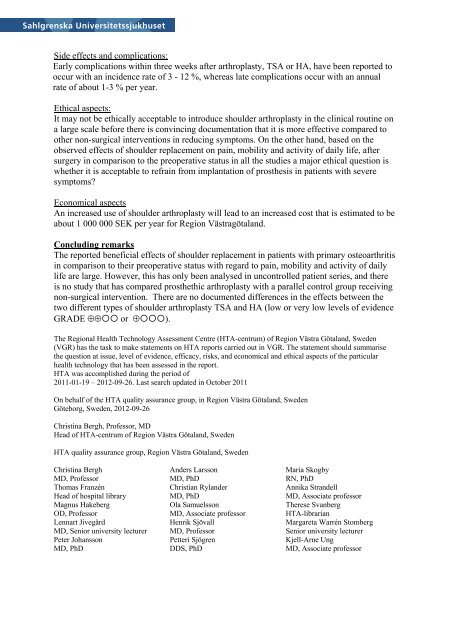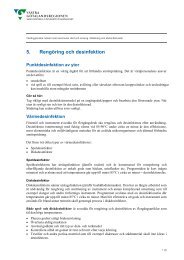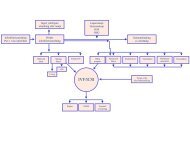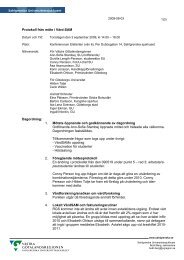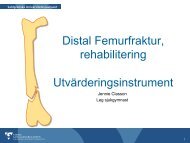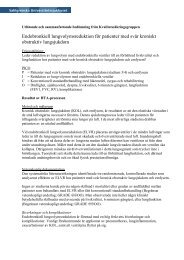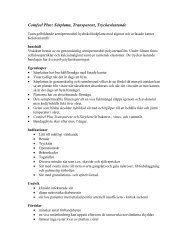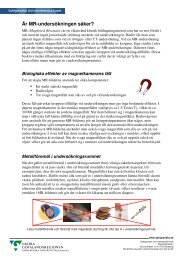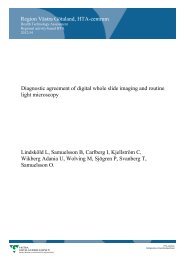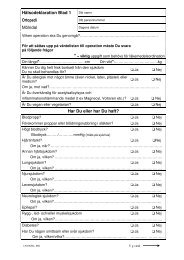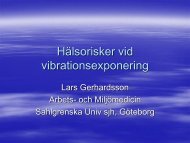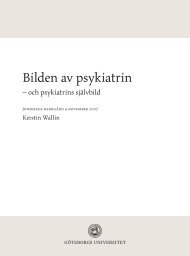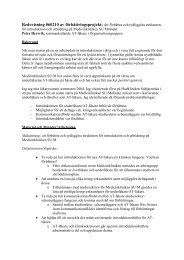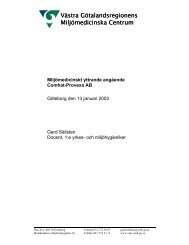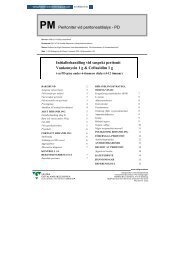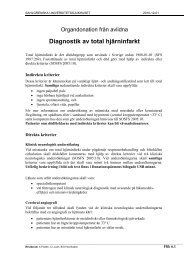HTA - Sahlgrenska Universitetssjukhuset
HTA - Sahlgrenska Universitetssjukhuset
HTA - Sahlgrenska Universitetssjukhuset
Create successful ePaper yourself
Turn your PDF publications into a flip-book with our unique Google optimized e-Paper software.
Side effects and complications:<br />
Early complications within three weeks after arthroplasty, TSA or HA, have been reported to<br />
occur with an incidence rate of 3 - 12 %, whereas late complications occur with an annual<br />
rate of about 1-3 % per year.<br />
Ethical aspects:<br />
It may not be ethically acceptable to introduce shoulder arthroplasty in the clinical routine on<br />
a large scale before there is convincing documentation that it is more effective compared to<br />
other non-surgical interventions in reducing symptoms. On the other hand, based on the<br />
observed effects of shoulder replacement on pain, mobility and activity of daily life, after<br />
surgery in comparison to the preoperative status in all the studies a major ethical question is<br />
whether it is acceptable to refrain from implantation of prosthesis in patients with severe<br />
symptoms?<br />
Economical aspects<br />
An increased use of shoulder arthroplasty will lead to an increased cost that is estimated to be<br />
about 1 000 000 SEK per year for Region Västragötaland.<br />
Concluding remarks<br />
The reported beneficial effects of shoulder replacement in patients with primary osteoarthritis<br />
in comparison to their preoperative status with regard to pain, mobility and activity of daily<br />
life are large. However, this has only been analysed in uncontrolled patient series, and there<br />
is no study that has compared prosthethic arthroplasty with a parallel control group receiving<br />
non-surgical intervention. There are no documented differences in the effects between the<br />
two different types of shoulder arthroplasty TSA and HA (low or very low levels of evidence<br />
GRADE ⊕⊕�� or ⊕���).<br />
The Regional Health Technology Assessment Centre (<strong>HTA</strong>-centrum) of Region Västra Götaland, Sweden<br />
(VGR) has the task to make statements on <strong>HTA</strong> reports carried out in VGR. The statement should summarise<br />
the question at issue, level of evidence, efficacy, risks, and economical and ethical aspects of the particular<br />
health technology that has been assessed in the report.<br />
<strong>HTA</strong> was accomplished during the period of<br />
2011-01-19 – 2012-09-26. Last search updated in October 2011<br />
On behalf of the <strong>HTA</strong> quality assurance group, in Region Västra Götaland, Sweden<br />
Göteborg, Sweden, 2012-09-26<br />
Christina Bergh, Professor, MD<br />
Head of <strong>HTA</strong>-centrum of Region Västra Götaland, Sweden<br />
<strong>HTA</strong> quality assurance group, Region Västra Götaland, Sweden<br />
Christina Bergh<br />
MD, Professor<br />
Thomas Franzén<br />
Head of hospital library<br />
Magnus Hakeberg<br />
OD, Professor<br />
Lennart Jivegård<br />
MD, Senior university lecturer<br />
Peter Johansson<br />
MD, PhD<br />
Anders Larsson<br />
MD, PhD<br />
Christian Rylander<br />
MD, PhD<br />
Ola Samuelsson<br />
MD, Associate professor<br />
Henrik Sjövall<br />
MD, Professor<br />
Petteri Sjögren<br />
DDS, PhD<br />
Maria Skogby<br />
RN, PhD<br />
Annika Strandell<br />
MD, Associate professor<br />
Therese Svanberg<br />
<strong>HTA</strong>-librarian<br />
Margareta Warrén Stomberg<br />
Senior university lecturer<br />
Kjell-Arne Ung<br />
MD, Associate professor


